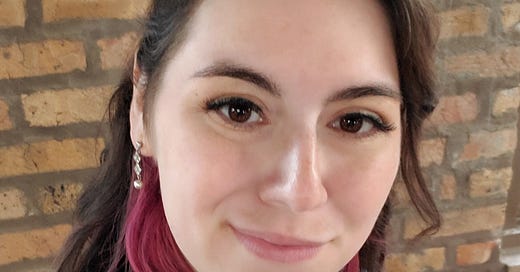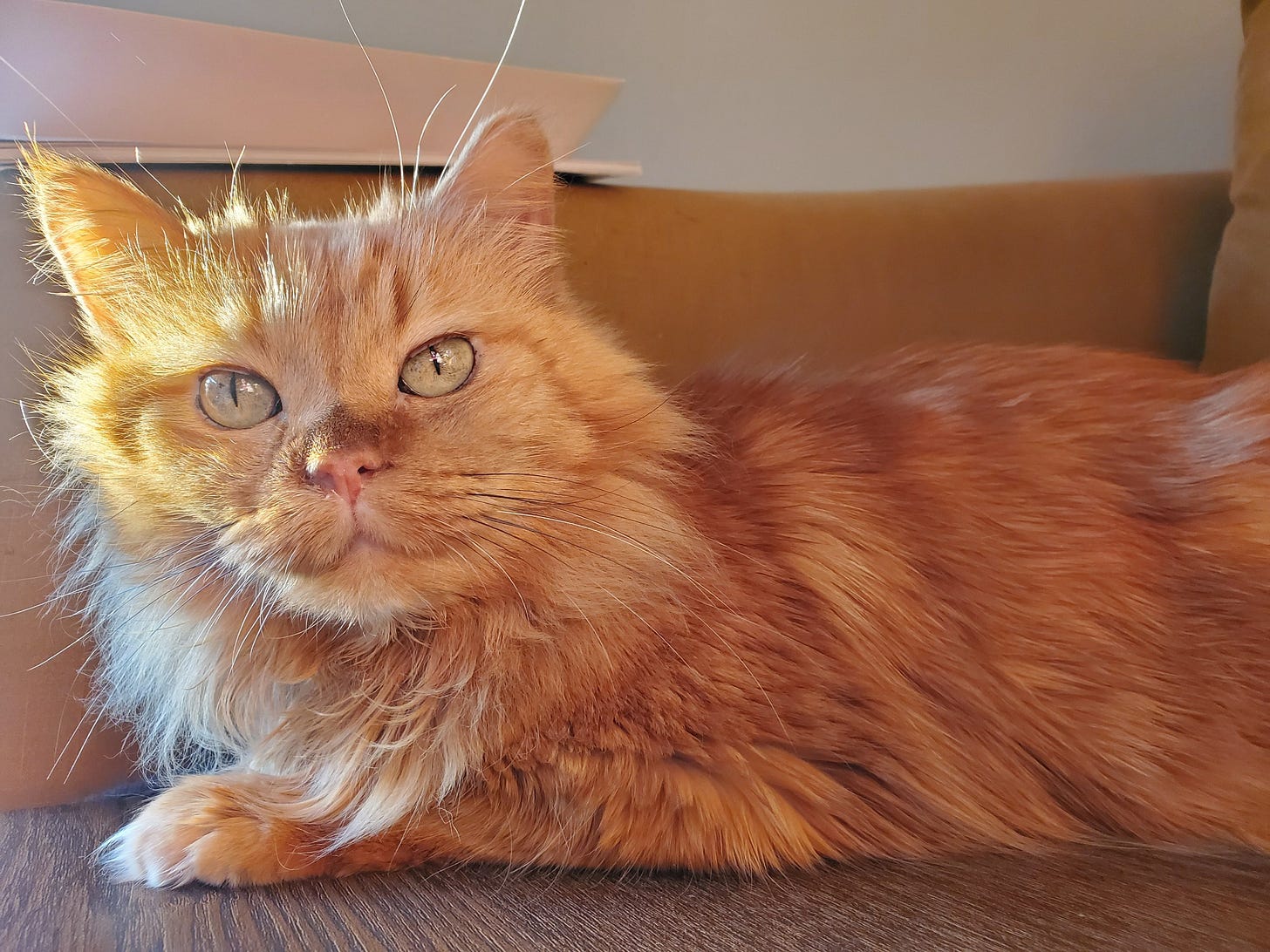Vol. 1, Issue 30
According to the 2021 study, “Loneliness in America,” 61% of young adults feel lonely—a statistic that makes you want to put your head down on your desk and groan. But that finding gives a glimpse at how loneliness saturates early vocational life. Whether you work in-person or remotely, one of the most painful realities of young professionalism is personal isolation.
But this week, interviewing Rosalia Portillo showed me that there are good ways to cope with the loneliness of being a soul with other souls at work.
Rosalia has done everything from small business management to community theatre to nonprofit engagement. She has an MFA in Directing and has a love for the work of David Mamet. But she’s also taught theatre at Fox Valley Park district and done work with kids at the Jewish Council for Youth Services. You’d think she’d be perpetually on the lookout for the next passion project. But not so: today she works in corporate America as an assistant to a vice-president in a Walgreen’s executive suite. In all these jobs, Rosalia’s learned that there is such a thing as loving your work, and your co-workers, not wisely but too well.
This interview has been edited for brevity and clarity.
Rosalia: Loneliness is something that I've experienced at most every workplace that I've worked. There's an element, I think, of leadership positions that are inherently isolating. The example of Michael Scott is a good one—of a boss trying too hard to be a friend, when he needed to be a manager. You want to connect with the people underneath you. But there may be favoritism if you over-fraternize with people. So, my philosophy is kind but firm.
Craig: That kind-but-firm dialectic feels wise. It feels hard, too.
Rosie: I've had several instances when I worked with clients where parents had passed away. It happens more than you think it would. From a business standpoint, I have to find a way to say, I'm a human. I can see you. We still do need you to pay your bill. (You also get a lot of people who are doing OK and are just forgetful.)
Craig: I see the importance of that firmness. What does kindness look like?
Rosalia: I don't think it ever costs you to listen. I don't feel heard a lot of the time. And so, I want to give that to other people. I want to hear people when they're having difficulties.
Transparency is a huge thing for me, especially professionally.
Craig: Yep, as the good Dr. Brene Brown says, clear is kind. I think what I’m asking, though, has to do not just with being kind as an organizational leader, but asking for kindness as an employee. How have you communicated, Look, I'm in pain, I'm lonely?
Rosalia: Maybe I'll start with where I used to be, and then get to where I am now. My first year in grad school, I remember being in a class where we had to journal weekly, and I remember including my loneliness every single week. I was thinking, Either he's not reading these, or he doesn't care. I never said anything to him about it. I instead sought counseling, which gave me an outlet to talk to someone outside of theater about what was going on in theater.
I found that the loneliness wasn't something that was going to be alleviated by anyone else.
So, I found ways to connect inwardly, and I did that through mindfulness practice. That got me through a whole lot. I'm a very anxious person and doing research about that on my own to try to understand where some of the feelings came from was very helpful.
Craig: Do you ever talk to your one-ups about things like anxiety?
Rosalia: I will share personal things. Sometimes I'll ask them to be discreet. But I think it adds a necessary connection. My current boss is very good about this: You're a human first, and so if you need the time, take the time.
Craig: That personal disclosure requires some tact, I guess, which is especially tricky in these days when so many people work remotely. Are you among those people?
Rosalia: I have a hybrid schedule. I work from home more than half the time.
Craig: How does that shape your professional friendships?
Rosalia: I make an effort to make personal connections with people, show off my picture of my cat, talk about people dealing with their parents—those conversations are still happening. But with this new position, I no longer have a desire for a workplace buddy.
Craig: What advice would give for younger professionals about negotiating healthy relationships at work?
[A cat decides at this precise moment to make a cameo appearance onscreen.]
Rosalia: Yes, sorry. Cattail.
Craig: Love it. What's the name?
Rosalia: This is Beans. Yep, he's very interested in you. The first thing that popped in my head when you said that was, I treat most conversations with people at work like they’re ice breakers, even with people that I've been talking now for six or seven or eight months. I'll share things about I’m dating this guy or even some dating difficulties. But I won't share about how that connects to childhood loneliness. There are certain levels you feel comfortable sharing.
Craig: It’s hard trying to be the human at work without being the Super-Needy Human.
Rosalia: I think there's a penchant, especially in my age group, who grew up hearing, Find something you love, and you won't work a day in your life. Essentially, we were told, in coded language, that our job is our identity. In the last two years, we've started breaking that down and rebuilding it for ourselves. And so now I'm pendulum-swinging to the other side and saying a job is a job. It's not an identity. I don't even particularly like what I do. I'm good at it. And if I don't put my personal stock in it, it allows me to do the things I want to do, instead of looking at it as a way to fulfill myself.
Craig: That brings us back to human loneliness, right? Turning my job into my identity turns my coworkers into my family. And when you’re trying to ship the products, file the invoices, tie down the lists—well, all that family stuff gets to be a lot.
Rosalia: As much as I want to make personal connections with people at work—and it sucks to feel lonely—at the end of the day, everyone is trying to do their job. You can feel a personal connection with somebody—and you would have been best friends within another context. But I can't let the personal side of things take away my ability to make a living and exist.
Craig: I’m feeling lonely because I can’t make a human connection with Beans. He and I will just have to go to meetup.com. Here’s my question: If your coworkers aren't your family, how do you think of them?
Rosalia: I think of them as colleagues. I think there's an inherent respect to that term. We're collegiate with each other. It’s more than an acquaintance, but at the same time, there's a formal level to that. It’s not the same as a friend.
Craig: Thank you, Rosie, for helping the rest of us think again about the way we love our work and care for our coworkers. Lovely to be with you. And thank you for your very generous conversation.
Rosalia: Absolutely. And a goodbye for Mr Beans!
One of Rosalia’s remote-work companions. This one’s named Fergus
WILF (Who I’m Learning From)
I confess this this week’s WILF is a little Atlantic-Heavy. I came across Kristen Radke’s graphic novel in a review by Apoorva Tadepalli. The book “shows how recognizable and universal loneliness is—but also how easy it is to remove ourselves from others’ loneliness, to turn theirs into an experience incompatible with our own.” Meanwhile, the Making Caring Common Project came out with an important study last year about the pervasiveness and the consequences of loneliness and, encouragingly, how better community is possible. “We have commitments to ourselves,” the study notes, “but we also have vital commitments to each other, including to those who are vulnerable.” And finally, the always resourceful Derek Thompson explores some of the lonely futures of work in this short video.







